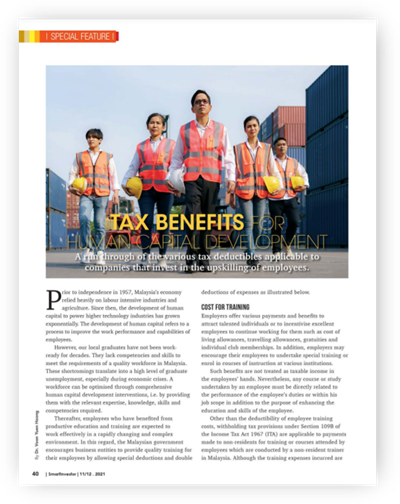
Tax Benefits for Human Capital Development

Prior to independence in 1957, Malaysia’s economy relied heavily on labour intensive industries and agriculture. Since then, the development of human capital to power higher technology industries has grown exponentially. The development of human capital refers to a process to improve the work performance and capabilities of employees.
However, since decades ago, our local graduates have not been work-ready. They lack competencies and skills to meet the requirements of a quality workforce in Malaysia. These shortcomings translate into a high level of graduate unemployment, especially during economic crises. A workforce can be optimized through comprehensive human capital development interventions i.e. by providing them with the relevant expertise, knowledge, skills and competencies required. Thereafter, employees who have benefited from productive education and training are expected to work effectively in a rapidly changing and complex environment. In this regard, the Malaysian government encourages business entities to provide quality training for their employees by allowing special deductions and double deductions of expenses.
This article was first published in the Smart Investor (Nov/Dec 2021) issue.
Cost for Training
Employers offer various payments and benefits to attract talented individuals to join them or to incentivise excellent employees to continue working for them such as cost of living allowances, travelling allowances, gratuities and individual club memberships. In addition, employers may encourage their employees to undertake special training or enrol in courses of instruction at various institutions. Such benefits are not treated as taxable income in the employees’ hands. Nevertheless, any course or study undertaken by an employee must be directly related to the performance of the employee’s duties or within his job scope in addition to the purpose of enhancing the education and skills of the employee.
Other than the deductibility of employee training costs, withholding tax provisions under Section 109B of the Income Tax Act 1967 (ITA) are applicable to payments made to non-residents for training or courses attended by employees which are conducted by a non-resident trainer in Malaysia. Although the training expenses incurred are deductible under section 33(1) of ITA, the said expenses are disallowed for deduction under paragraph 39(1)(j) of ITA if the withholding tax on the payment made is not paid or remitted to the Inland Revenue Board of Malaysia (IRBM). Nevertheless, if the withholding tax and the late payment penalty have been settled subsequently, the payment made to the non-resident can be allowed as a deduction.
However, if employees are paid by way of a scholarship, grant or allowance, whether or not in connection with the employment of that individual, the money received by the employee is tax exempted in his hands pursuant to paragraph 2, Schedule 6 of ITA.
The training expenses incurred by companies for their potential employees are generally not allowed for tax deduction. However, companies which incur training expenses on their potential employees to impart basic skills for a company prior to the commencement of its business operations (i.e. pre-operational business expenses) are allowed tax deduction. The condition is that the training expenses shall be incurred within one year before the commencement of business and the expense is a type that is allowable under Section 33 of ITA. In determining the date of commencement, consideration is required of all the circumstances and facts of each case from the tax perspective.
The above single deduction is not applicable to a company which receives grants from the government or which claims double deduction of training expenses under the Income Tax (Deductions for Approved Training) Rules 1992.
Double Deduction for Approved Training Expenses
A manufacturing company is allowed to claim double deduction for any expenditure incurred in training its employees for the purpose of acquisition and upgrading of its employees’ craft, supervisory and technical skills or increasing the productivity or quality of its products. For non-manufacturing and hotel or tour operating companies, a double deduction is applicable for expenses incurred for approved training programmes approved by Ministry of Finance (MOF). The summary of double deduction for companies which incur expenses on approved training programmes is appended below:
|
Industry |
Manufacturing |
Non-manufacturing |
|
|
Company Status |
Pre-operation |
In operation |
In operation |
|
Approved Training Programme |
Acquisition of craft, supervisory or technical skills |
Upgrading and developing the employees' craft, supervisory and technical skills |
Relating to business operations |
|
Training purpose |
Contributes directly to the future production of its products |
Increases the productivity or quality of its products |
Increases productivity or efficiency |
|
Approved Bodies |
|
|
|
|
Qualifying Employee |
Malaysian citizens |
Malaysian citizens |
Malaysian citizens |
|
Supporting Documents |
|
|
|
|
Reference |
Income Tax (Deductions For Approved Training) Rules 1992 |
||
Double Deduction on Implementation of Flexible Working Arrangements (FWA)
The above double deduction was first introduced in 2015 by way of the gazette order, Income Tax (Deduction for Consultancy and Training Costs for Implementation of Flexible Work Arrangements) Rules 2015. FWA (also known as work from home) were not widely adopted then. During the pandemic period in 2020, the Malaysian Government had reintroduced double deduction on the qualifying expenses incurred by qualifying persons, i.e. companies, partnerships and limited liability partnerships to ensure the sustainability of business entities in Malaysia. The FWA double deduction is applicable for applications submitted by a qualifying person to Talent Corporation Berhad for implementation or enhancement of FWA from 1 July 2020 to 31 December 2022. The qualifying expenses include consultation fees, cost of capacity development or training fees and training related costs, cost of software and software subscriptions.
In view of the tax benefits offered by the Malaysian government on qualifying training expenses and advantages gained from providing training for employees, business entities may deliberate whether to allocate a greater budget for human capital development to improve the productivity and efficiency of their employees in the long term.
Our Expert

